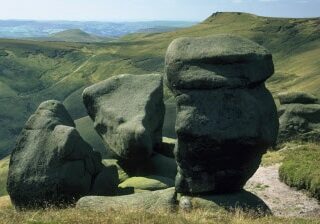The Kinder Scout mass trespass of 1932 is now a sacred event in rambling circles, but at the time neither the society nor the inchoate ramblers’ federations backed it. Five of the trespassers were arrested and jailed. It was falsely alleged that they had attacked and injured keepers.
This was part of the growing movement for free access to the hills, and numerous rallies throughout the 1930s publicised the outrageous way in which walkers were excluded.
The Access to Mountains Act 1939 was badly named. It started out as a useful measure but it was mangled during its passage through parliament, not least because of the furtive work of Lawrence Chubb.
The bill, presented by Arthur Creech Jones (the Labour MP for Shipley), aimed to give the public the right of free access to uncultivated land, subject to provisions preventing abuse of the right. No owner or occupier of such land would be entitled to exclude or bar walkers. However, it emerged that Chubb was working behind the Ramblers’ backs to appease landowners.
The Access to Mountains Act 1939 did not provide a general right of access. Access was to be given by order, made by the minister, on the application of the owner, local authority or organisation representing users. It applied to mountain, moor, heath, down and cliff, in limited circumstances, and was only available during daylight hours. There was a list of restrictions, breach of which would be a crime. Thus, mere trespass would have become a criminal offence punishable by fine.


The statutory rules and orders which followed made matters even worse. Anyone wanting access had to pay for the application and much else. The regime was unworkable and nasty.
Yet Chubb persisted in arguing that it was a good thing. In the society’s annual report for 1939 he said that the negotiations with landowning organisations ‘were carried on in the friendliest spirit, and the society desires to record its deep appreciation of the manner in which the representatives of the landowners endeavoured to reconcile its views with their natural desire to avoid any undue interference with private rights of property’.
He went on to scoff at ‘the small but active body of critics who persistently opposed the measure because it did not slavishly follow the impracticable scheme of the original bill’.
By the time of the annual report of 1946 Chubb had had the sense to admit that the act was unworkable; fortunately, it never came into operation. The war intervened and the act was repealed by the National Parks and Access to the Countryside Act 1949.
